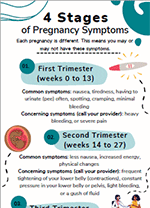I Want to Feel Prepared for My Pregnancy Experience as a Black Birthing Person
Getting ready for the birth of a child is a time of joy for families. However, Black birthing persons often report not being treated respectfully during pregnancy. Being treated unfairly because you are pregnant or because of the color of your skin, can be stressful and contribute to poor outcomes for you and your baby. You can be prepared by knowing that you matter, knowing that you have rights as a Black birthing person, and knowing what to expect during pregnancy. It is also important to know where to find help and support to get what you need. Choose a care provider that you trust and invite family and friends to join you at your care appointments to speak on your behalf when you are unable to.
The Black Birthing Bill of Rights, created by the National Associate to Advance Black Birth, is a great resource for Black birthing persons and their care providers. It covers your rights to be heard and respected, your rights to choose your care options, your right to receive information to help you make informed decisions and your right to mediation when you have been treated unfairly in the health care setting.
Knowing what to expect at each stage of pregnancy can also help you feel more prepared. The 40 weeks of pregnancy are divided into three periods called trimesters. Your first trimester begins on the date of your last menstrual cycle. Each trimester has different symptoms. The symptoms you experience may be different from others. Bring any concerns you have to your prenatal appointments and discuss them with your provider.
4 Stages of Pregnancy Symptoms
-

First Trimester (weeks 0 to 13)
Common symptoms: nausea, tiredness, having to urinate (pee) often, spotting, cramping, minimal bleeding
Concerning symptoms (call your provider): heavy bleeding or severe pain
-

Second Trimester (weeks 14 to 27)
Common symptoms: less nausea, increased energy, physical changes
Concerning symptoms (call your provider): frequent tightening of your lower belly (contractions), constant pressure in your lower belly or pelvis, light bleeding, or a gush of fluid
-

Third Trimester (weeks 28 to 40)
Common symptoms: heartburn, backaches and mild tightness in your lower belly (Braxton Hicks contractions help to prepare your body for delivery)
Concerning symptoms (call your provider): frequent tightness (a sign of preterm labor), swelling of hands and feet, eyesight changes, belly pain, or abnormal bleeding
-

Fourth Trimester (12 week period)
Common symptoms: general discomfort, hormonal fluctuations, swelling (2 to 3 weeks), bleeding (2 to 3 weeks)
Concerning symptoms (call your provider): excessive bleeding, headaches, dizziness, extreme sadness, or persistent pain

"4 Stages of Pregnancy Symptoms" by Mecklenburg Birthing Connections (pdf)
Download Now
Atrium Health Carolinas Medical Center’s Maternity Center
Helpful Resources
- For more information on what to expect during each stage of pregnancy visit : Your Guide to Pregnancy and Motherhood | Atrium Health
- Atrium Health Carolinas Medical Center's Maternity Center
- Black Birthing Bill of Rights (pdf)
- Signs and Symptoms of Preterm Labor
- Preterm Birth (CDC)
- NIH Pregnancy and Labor Videos
- Questions Every Black Mom-to-be Should Ask Her Ob/Gyn
